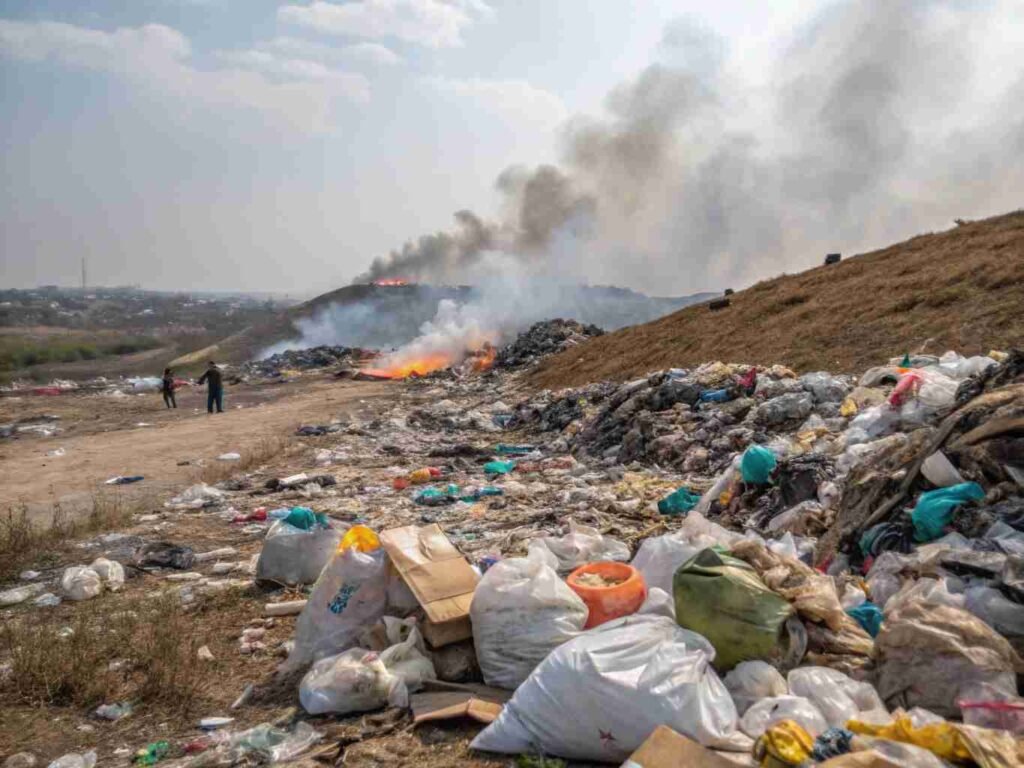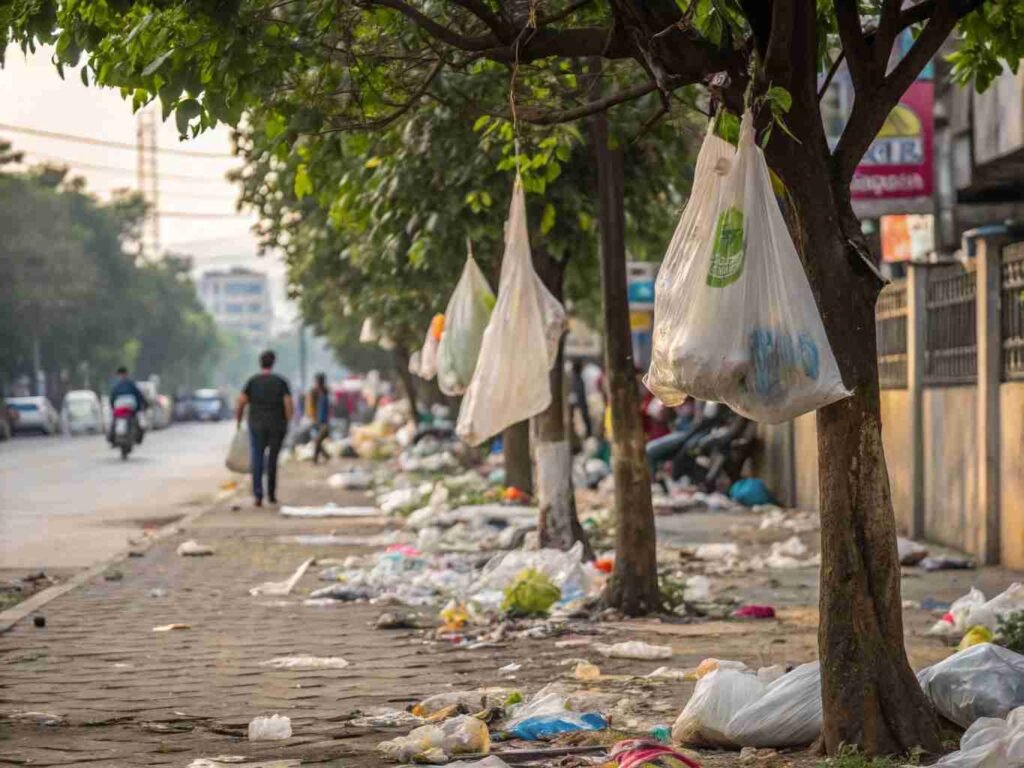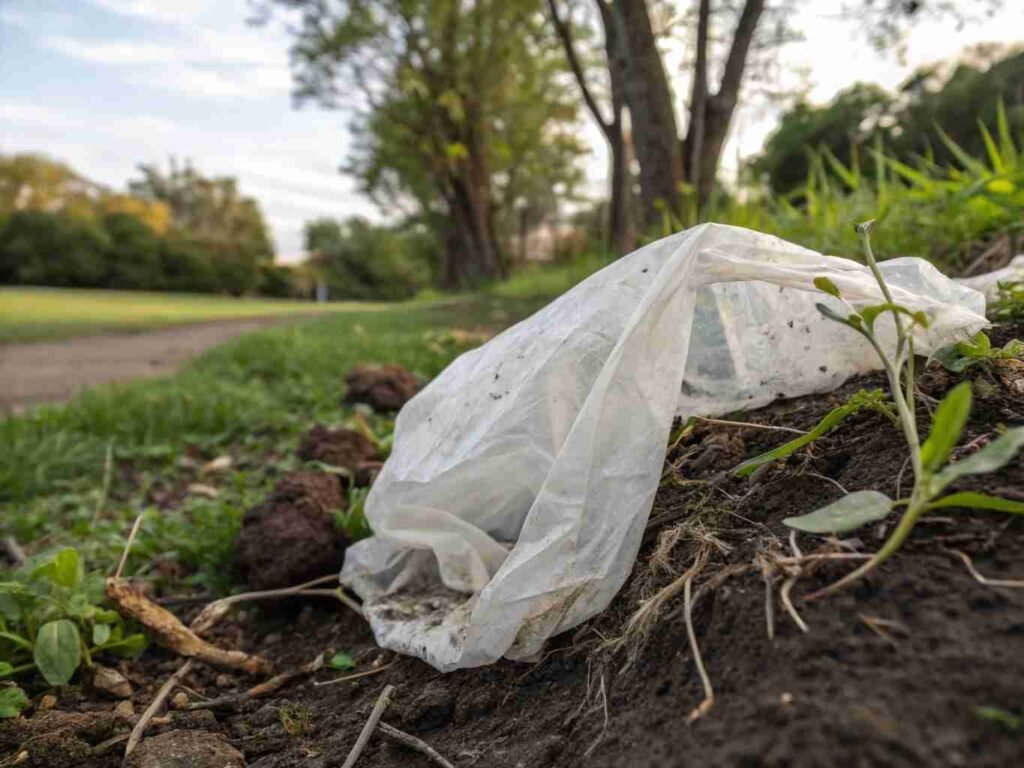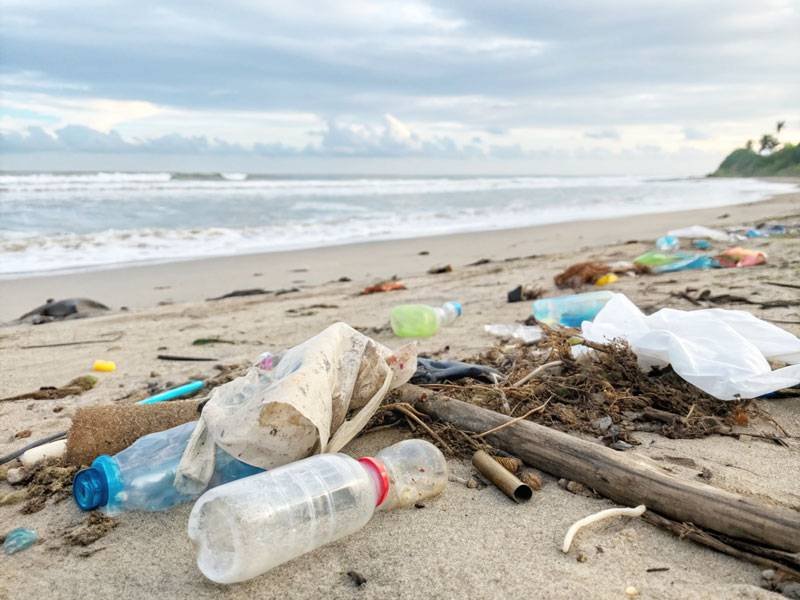Plastic bags have become one of the most commonly used packaging materials worldwide because of their lightness, durability and low cost. Whether it is supermarket shopping, express packaging, or carrying items in daily life, plastic bags are almost everywhere. It greatly facilitates people's lives, but it is this convenience that masks the serious environmental and health problems hidden behind plastic bags.
The widespread use of plastic bags has led to a large amount of plastic waste that is difficult to degrade, which has brought long-term and complex negative impacts on ecosystems and human society. It is urgent to pay attention and take effective measures.

Disadvantages of Plastic Bags
Impact of plastic bags on the environment
Difficult to degrade and long-term pollution
Plastic bags are mainly made of non-biodegradable materials such as polyethylene. They are extremely difficult to decompose in the natural environment, and the decomposition cycle is as long as hundreds of years. Plastic bags gradually break into microplastics in the soil and water. These tiny particles are widely present in the environment, difficult to remove, and can enter the bodies of animals and plants, and ultimately affect the ecosystem and human health through the food chain.
Garbage disposal dilemma
The recycling rate of plastic bags is extremely low, and the global effective recycling rate is less than 1%. A large number of plastic bags are discarded at will and enter landfills, occupying a large amount of land resources and increasing the environmental burden. During the landfill process, the harmful substances released by plastic bags will pollute the soil and groundwater, affecting the sustainable use of land. The burning of plastic bags not only releases a large amount of toxic smoke and dioxins, but also causes serious pollution to the atmospheric environment, endangering the health of plants, animals and humans.
Pollution of water and land
Plastic bags float in rivers, lakes and oceans in large quantities, causing serious water pollution. Plastic garbage blocks drainage systems, causing urban waterlogging and environmental sanitation problems, and even causing disease transmission. In the ocean, plastic bags damage water quality, threaten the health of marine ecosystems, and affect fishery resources and marine biodiversity.

Harm to Wildlife
Ingestion and Suffocation
Many marine and terrestrial animals mistake plastic bags for food, which leads to digestive tract obstruction, malnutrition and even death after swallowing. Animals such as whales, turtles and birds face survival threats due to ingestion of plastic bags. The accumulation of plastic in their stomachs prevents them from taking in food and water normally, and eventually die of dehydration and starvation.
Entanglement and Injury
Plastic bags and other plastic products can entangle animals, restricting their ability to move, causing injuries or even death. The necks of animals such as seals and sea lions are tightly entangled by plastic ropes, causing serious trauma and infection. Large whales are entangled in abandoned fishing nets, restricting their movements and eventually drowning.
Chain reaction of the ecological chain
The harm caused by plastic bags to animals is not only an individual problem, but also destroys the balance of the entire ecosystem. The decline in animal populations and the break of the food chain affect the stability and biodiversity of the ecosystem.
Potential threats of plastic bags to human health
Release of harmful chemicals
Plastic bags contain harmful chemicals such as bisphenol A and benzopyrene, especially low-quality or recycled plastic bags, which contain excessive levels of carcinogens and heavy metals. Long-term contact or use in food packaging may have negative effects on human health, including carcinogenesis, endocrine disruption and reproductive system damage.
Risk of ingestion of microplastics in the environment
Microplastics formed by the decomposition of plastic bags are widely present in water sources and food, and humans ingest microplastics through drinking water and food. Although the long-term effects of microplastics on human health are still under study, their potential risks cannot be ignored and may trigger immune system reactions and chronic diseases.
Resource consumption and climate impact of plastic bag production
Petroleum resource consumption
Plastic bag production relies on non-renewable resources such as petroleum, and a large amount of fossil fuels are consumed during the manufacturing process, resulting in resource waste and increased environmental pressure.
Greenhouse gas emissions
Plastic bag manufacturing and transportation processes release a large amount of greenhouse gases, which promote global climate change. The carbon footprint of the plastic industry chain cannot be ignored and is an important part of the environmental burden.
Comparison with the environmental impact of other material bags
Although alternatives such as paper bags and cotton bags consume more resources on certain life cycle indicators, the difficulty of recycling and environmental persistence of plastic bags make their overall environmental impact more serious. The widespread use and low recycling rate of plastic bags make them a major source of environmental pollution.

Economic impact of plastic bag use
Cleaning costs and environmental governance burden
Plastic bag pollution has led to a significant increase in the cost of urban environmental cleaning and frequent public health problems. The government and society need to invest a lot of money and manpower to clean up plastic waste and remediate the environment, increasing the social and economic burden.
Challenges in policy and regulatory enforcement
Although many countries have introduced plastic bag bans and charging policies, the enforcement strength and coverage are insufficient, and some areas still use a large number of plastic bags. The policy is difficult to implement, and the supervision and law enforcement system needs to be further improved.
Consumer behavior and awareness
The habit of using plastic bags is deeply rooted, and consumers have limited acceptance of alternatives. Changing consumer behavior and raising environmental awareness requires long-term education and publicity to promote the formation of a green consumer culture.

How to Reduce the Use of Plastic Bags
Bring your own eco-friendly bag
Bring your own eco-friendly bag. When shopping, use durable and reusable cloth bags or eco-friendly bags, which is convenient and environmentally friendly. Many shopping malls charge for plastic bags and encourage customers to bring their own shopping bags. Use plastic bags reasonably when shopping, such as putting multiple loose fruits and vegetables in one bag, and saving plastic bags for garbage bags after shopping, etc., to extend their service life.
Charge or ban plastic bags
The government has passed legislation to restrict or prohibit the free provision of disposable plastic bags, and implemented a charging policy to significantly reduce the use of plastic bags. There have been successful cases in China, the European Union and parts of the United States. Policies are combined with publicity and supervision to encourage merchants and consumers to comply with regulations, jointly promote green consumption, and enhance public environmental awareness.
Use alternative materials and products
Choose shopping bags made of natural materials such as paper bags, cloth bags, sacks, Biodegradable bags as alternatives to plastic bags. These eco-friendly bags are degradable and durable, and are convenient for long-term use. Use sealed jars, glass boxes, and fresh-keeping boxes instead of plastic fresh-keeping bags in the home to reduce the use of plastic bags and reduce food waste. Merchants promote environmentally friendly packaging and reduce the distribution of plastic bags.
Reduce the use of disposable plastic products
Plastic bags are often used with disposable items such as plastic tableware and straws. Reducing the use of these items will reduce the overall demand for plastic. Consumers can bring their own reusable tableware, cups and straws to reduce takeout plastic waste. Bring a water bottle to reduce the purchase of bottled water, save resources and reduce plastic waste.

Raise public environmental awareness
Popularize the hazards of plastic pollution through education, community publicity and media reports, and enhance the sense of environmental responsibility. Environmental organizations and governments hold activities such as "Plastic Free Day" to encourage public participation. Advocate the reuse of old plastic bags, such as garbage bags, to reduce waste. Only by adhering to environmental protection habits for a long time and forming a social consensus can the use of plastic bags be effectively reduced.
Choose bulk goods and reduce packaging needs
Prioritize the purchase of bulk goods, avoid excessive packaging, and reduce the demand for plastic bags. Many supermarkets support customers to bring their own containers to load bulk goods. Reasonably plan shopping methods, reduce dependence on plastic bags, reduce the generation of packaging waste, and achieve resource conservation and environmental protection.
Conclusion
As a convenient tool in modern life, plastic bags bring environmental pollution, ecological damage and health risks that cannot be ignored. Plastic bags are difficult to degrade, pollute soil and water, threaten the survival of wild animals, and potentially harm human health. At the same time, they aggravate resource consumption and climate change, and increase the burden of social governance.





